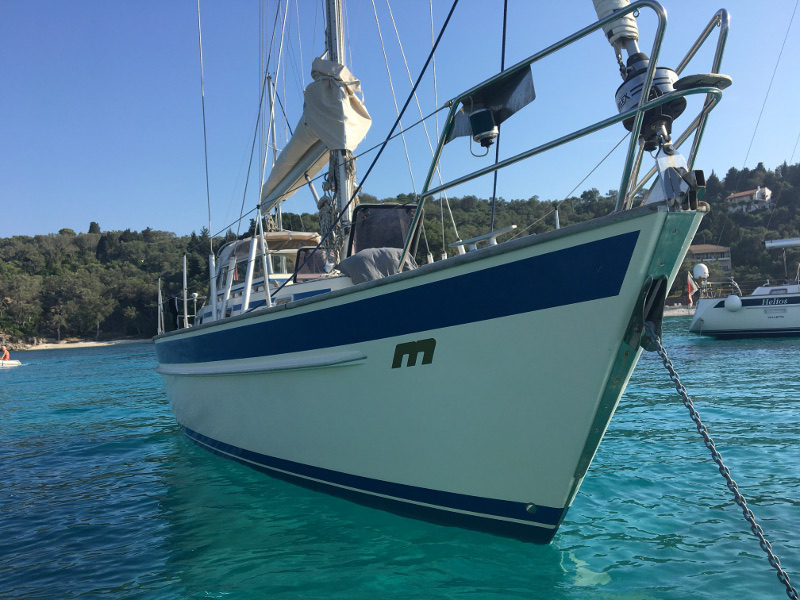
Lakka at Paxos – the most beautiful ankering
39° 14′ 13.2468” N 20° 7′ 57.8856” E
May 31th 2018
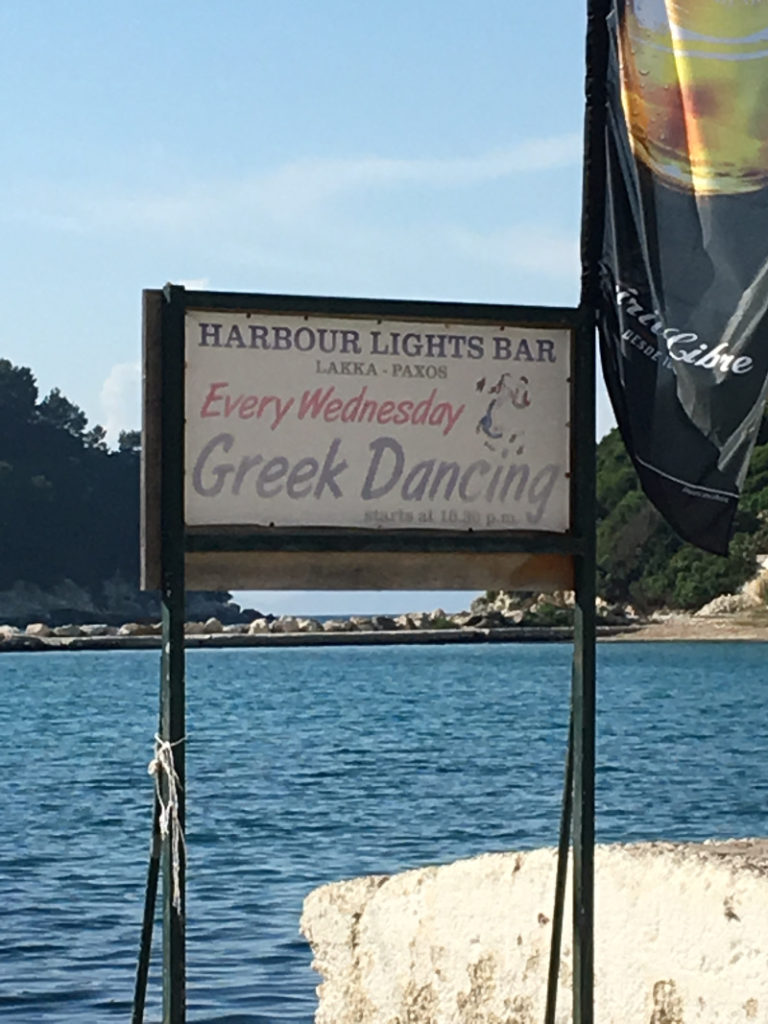
The people in the city of Lakka make a living of the many tourists who come either in their own boat or in one of the many tripperboats. Along the quayside of the city is one tavern next to the other, ready to enjoy the tourists.
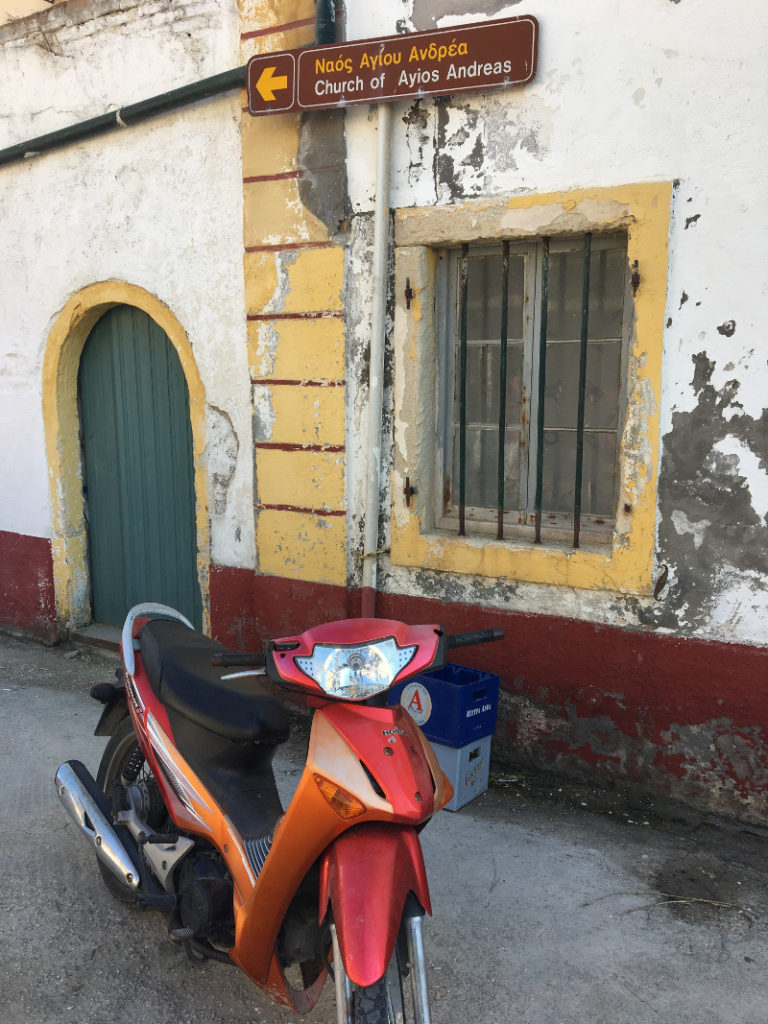
Many houses in the town needs a little painting
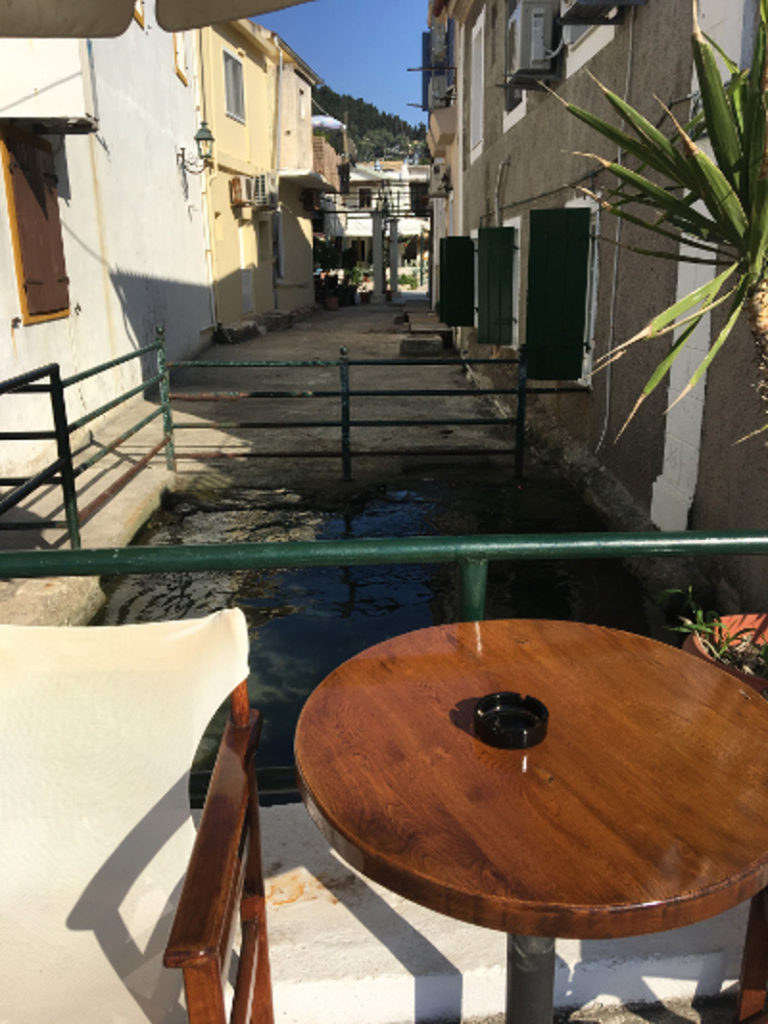
The water goes all the way up the street
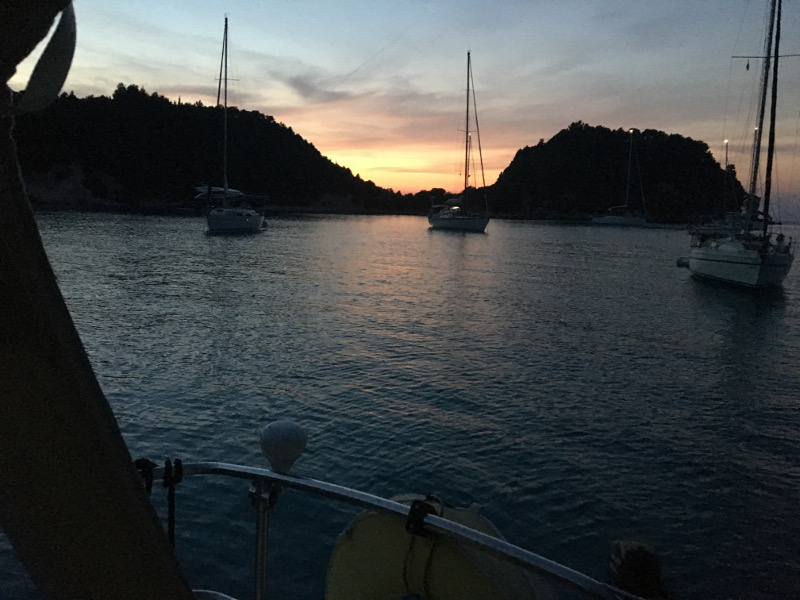
Sunset at Lakka
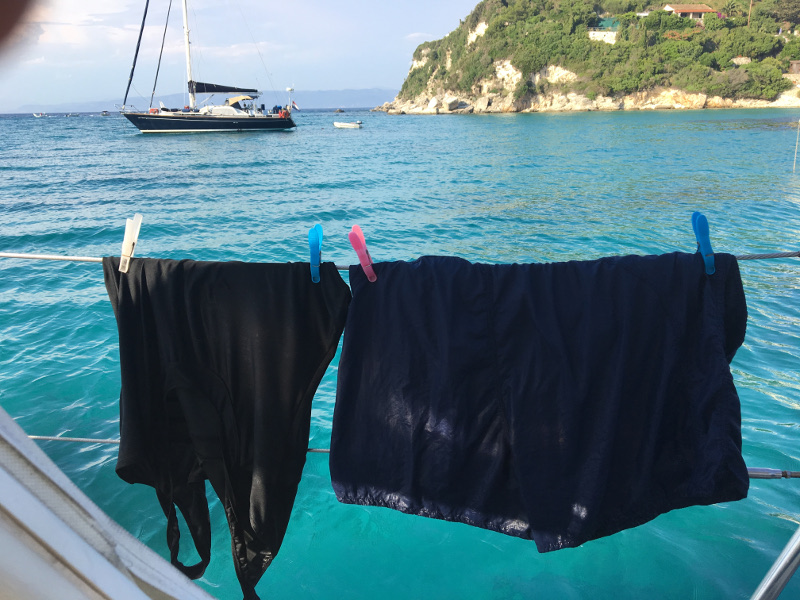
Despite the fact that we were both burned by lion’s mane jellyfish we could not withstand the turquoise green bathing water
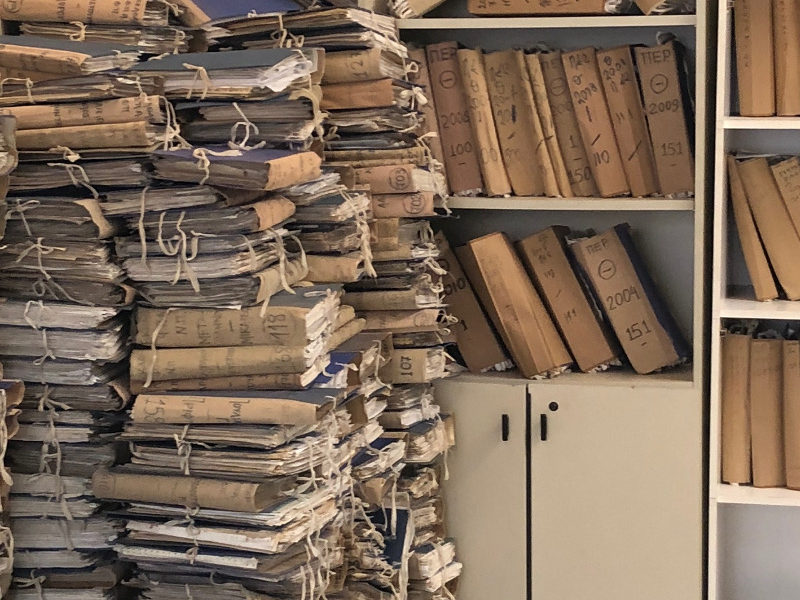
Crossing between smiles and beautiful women, this is how you get a Greek sailing certificate
39° 37′ 48.9” N 19° 54′ 4.6944” E
May 17th
She is young, beautiful and absolutely professional when she – with only the hint of a smile – gives me the document, she just wrote, printed, stamped twice and signed once. “Here you are, Sir,” she says, explaining that the very first thing, that is going to happen is that I shall pay 15 euros to get into Greece.
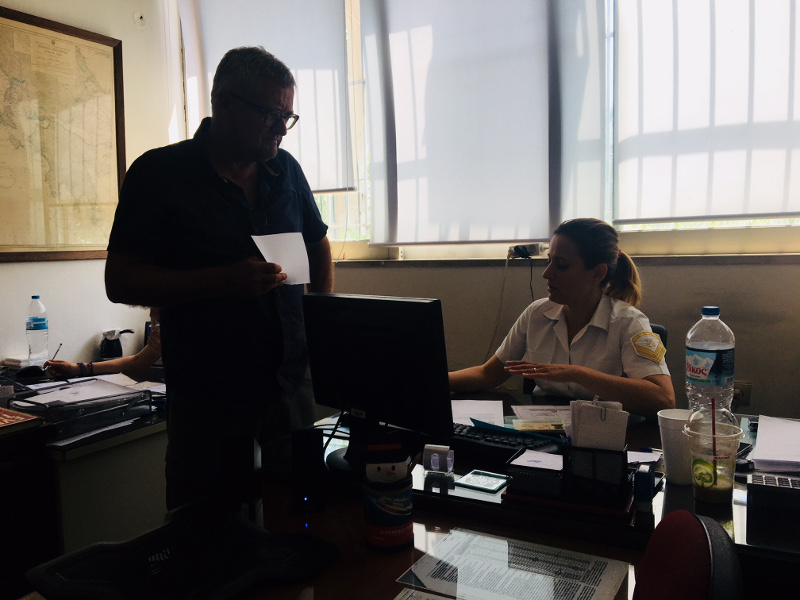
First office. First day. At a time when I am not aware of how many offices, I have to visit to get my DEKPA-paper
I take 15 euros from my pocket and pass them to her.
“No, no. Not here. You must go to office number 5 in order to pay. Return to the lobby, take the next corridor and go into office number 5. Once you have paid, you can come back to me.”
I walk down the next corridor, knock on a closed door and find a sweating officer, who apparently is stabilizing huge stacks of meters of papers and folders standing on his office floor, and seeming to be able to overturn every moment.
I explain that I have come to pay him 15 euros. Without words he finds a date block, asking me to fill in a few fields, then he stamps and signs. I pay 15 euros and return to start – to the beautiful customs officer in office number 7.
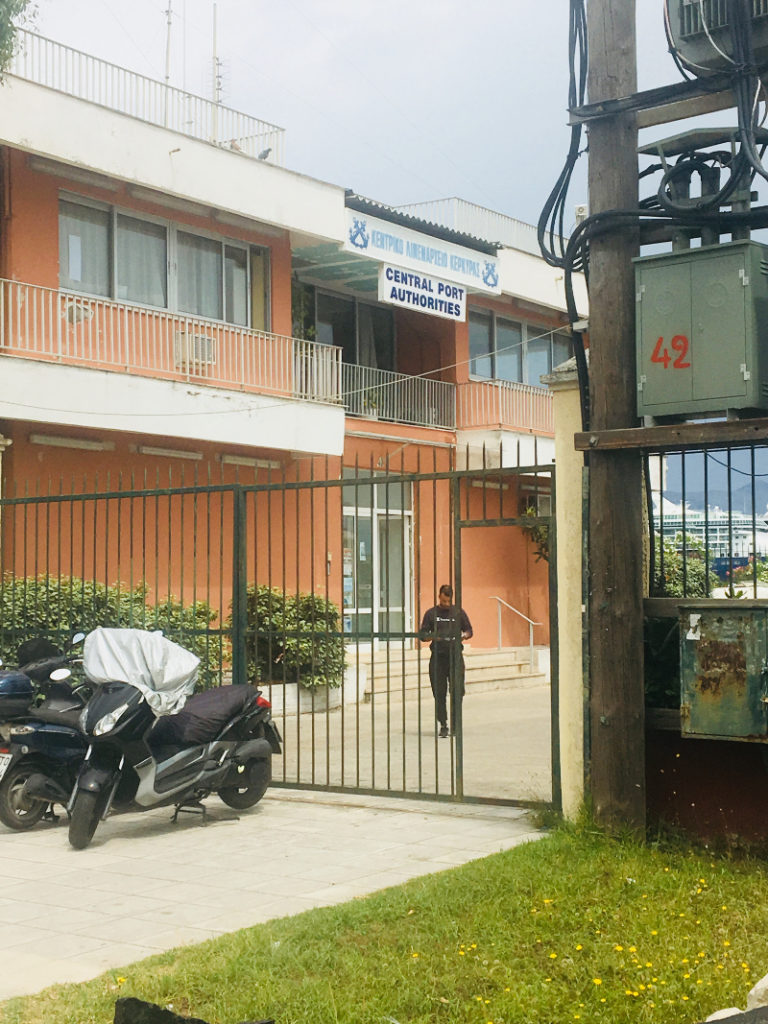
In Corfu the harbour police and the customs share one building to receive new sailors into Greece. Does that make it more easy for the sailors? That is yet to be proven
I am moving around in the Central Port Authority of Corfu, where customs and port police reside, and I am trying to get a so-called DEKPA document, which any foreign leisure boat over ten meters must have in order to sail in Greece waters.
“Well done,” nods the beautiful speaker acknowledging and accepts the receipt, that I have paid 15 euros. “Now hear this,” she explains. “The document I have made today is a temporary document, because you should have actually been at the tax office in Corfu Town to pay 50 euros for your DEKPA-certificate, and then you should have returned to me, and we could have finished the final document.”
But it is two o’clock, she explains. And at two o’clock p.m. the tax office closes. She gives me a Cyrillic city map, showing that the tax office is two kilometers from the Central Port Authority.
“Come back again tomorrow to office number 7, after you’ve been at the tax office,” she smiles.
Next morning I start at 9.30. I have entered the tax office’s address in Google Maps and I am led to a large, square building, that might look like a tax office. I enter through one of the two main entrances of the building and hope, it will lead me to the tax office.
All signposts are written in Greek with Cyrillic letters, I draw a number, get a seat in the waiting room, and when it is my turn, I walk freshly to the desk and ask in English: “Is this the tax office?”
No, the woman in the desk explains me kindly. “You must enter through the other main entrance of the building and go straight on to the first floor.”
How nice, I’m on track! On the first floor, I go down a corridor, still I have no clue of the Greek names for the task of each office, so I knock on the door to office number 1 and ask if they are the tax office? A woman explains that yes, they are, but the errand I come in, must be solved at office number 11, down the corridor, on the left.
I ask a few Greeks outside office number 11, if they are in line, but they shake their heads indicating, that they do not understand English. I am waiting patiently until I see that standing in a line, is not a core competence of the Greek people. New people show up, bust into the office directly, and when they discover that the office is busy, they back out and take the front position of the queue.
I’m making myself wide as a door, trying to fill the entire doorway as a signal, that I am hard to pass. While I wait, I study the office. Five women are in the office working with huge stacks of papers. They do have computers, but the computer-mouse is parked on top of the keyboard, and the tool they use most is the kind of fungus used to keep your finger wet, when you browse through many papers. Fascinating! I have not seen such a fungus on a desk for 30 years!
Only one of the women in the office is working with the citizens in the queue. At one point she comes past me and sees me standing in the doorway with my document in my hand. She looks at the document and says, that it’s completely wrong. They do not handle that kind of business number 11. I have to get back, enter another corridor just before the stairs. There they will be able to handle my case.
Thanks, I say, and then I go and find a huge office with lots of counters, but again not one sign to tell me where to go. I ask the first desk employee I meet, and she points me two counters further. “Number two employee from here. She is not here right now. But she’s coming soon. Just wait “.
I take my place in the queue in front of the empty counter and spend the time observing Greek office life. A man empties the rest of his coffee into a plant and goes to the coffee machine to pick up a new one. Another man looks a little to the right and then to the left, collects his cigarettes and matches and goes purposefully towards the exit.
Outside the windows a group of high school students are training a march with flutes, drums and a flag in front. All the tax office employees run to the windows to photograph. Something interesting is happening.
My “case manager” arrives. “Sorry, but my system is down,” she explains, and after some time of waiting she finally gets in touch with her IT-system again and prints my wish to pay 50 euros to the Greek tax authorities for a DEKPA-proof, and relieved I take 50 euros out of my pocket and hand them over to her.
“Not here,” she kindly explains. “You have to go to the cashier to pay.”
“She explains where the cashier is, and when I go to the cashier, she puts another six-seven stamps on the paper, takes my 50 euros, and then I go back to my “case-manager”, showing that I have paid 50 euros to the Greek tax office.
“Are we done?” “Yes, that was it.” More smiles.
Yes! I feel my document is within reach, and I hurry through Corfu Town down to the Central Port Authority to get my DEKPA proof. I open the door to office number 7 and safe of victory declares: “Here I have the proof, that I have paid 50 euros!”
The people in the office are different than yesterday and the new ones are skeptical to my tax document.
“You need to go to office number 8. We can’t issue the document, before it is approved by office number 8.
“I open the door to office number 8, where two port police officers reside. I’m addressing the female officer, once again a beautiful young woman in chic white uniform-skirt, white shoes and white uniform blouse. Again, the woman shows up to be highly professional and strongly accustomed to compliance with rules.
She wants to see my registration certificate for the boat.
“Well, I showed that to your colleague yesterday. Now I do not have it anymore, it lies with the port-manager of Port Mandraki. ”
“Sorry. I can not issue a DEKPA-certificate, if I do not see your registration certificate.”
I try to tell her about my passport, my insurance papers and documentation for yacht skipper- and VHF-training. But nothing could interest her less.
“Sorry. Registration Certificate!
“But listen, there are several kilometers to Port Mandraki!”
“Yes,” smiles the officer. “But we’re open all day. You can come back in the late afternoon.”
Smiles and beautiful women. I choose to smile as well, while I swear inside myself of the prehistoric bureaucracy of the Greeks.
Later, both Kirsten and I return with the registration certificate, opens the door to office number 8 and announces that we are back – this time with the registration certificate.
Then the writing begins. A DEKPA-paper is obviously a many pages long document. The officer completes something, I fill in some of the blanks.
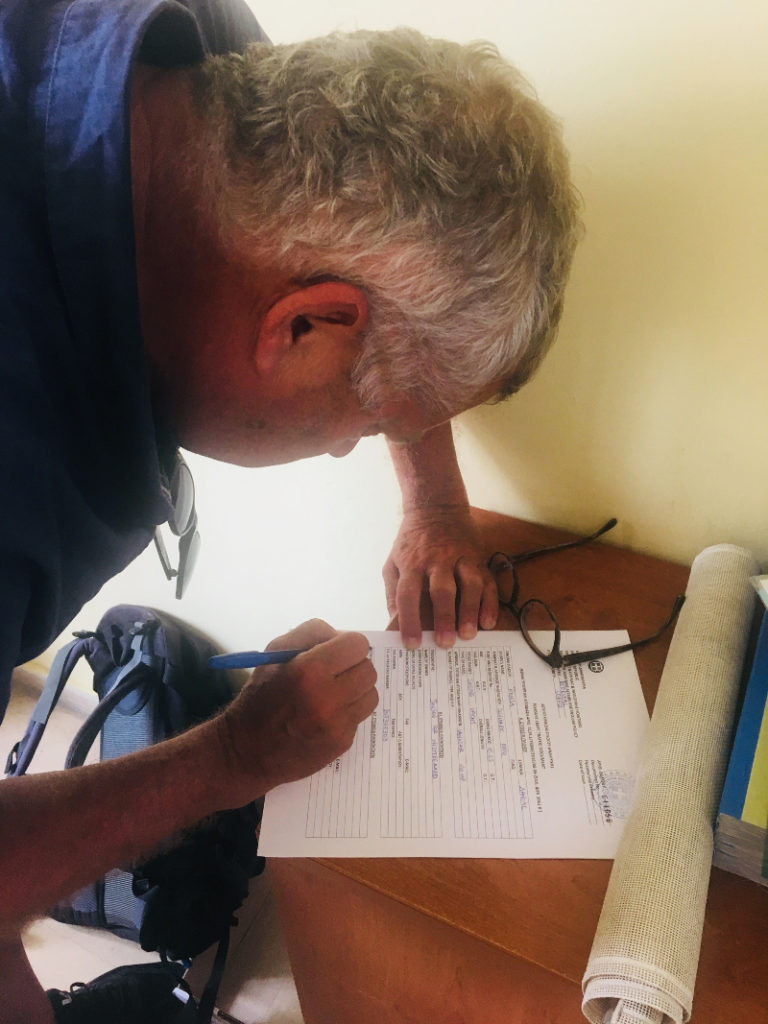
Quite a lot of the work you have to do yourself, but that seems okay. Precision is important
Finally, the paper gets four stamps, two signatures and it is copied. “Now you can go back to office number seven!”
At office number seven, there has been a shift of staff in the meanwhile, and the new customs officer does not know my case. She starts all over again. Certificate of registration, insurance, passport. It all gets copied. Questions are answered. The importance of the paper explained. Be sure to get it approved again in a year!
Thank you, thank you. We have passed the needle eye. After two half days, seven offices, a plethora of stamps, signatures, photocopies, an incomprehensible bureaucracy added with kindness and smiles, we now have a DEKPA proof.
The system has welcomed us to Greece, and the waters of the Greek islands is said to be the most beautiful, hospitable and enjoyable sailing ground in the world.
We are looking so much forward.
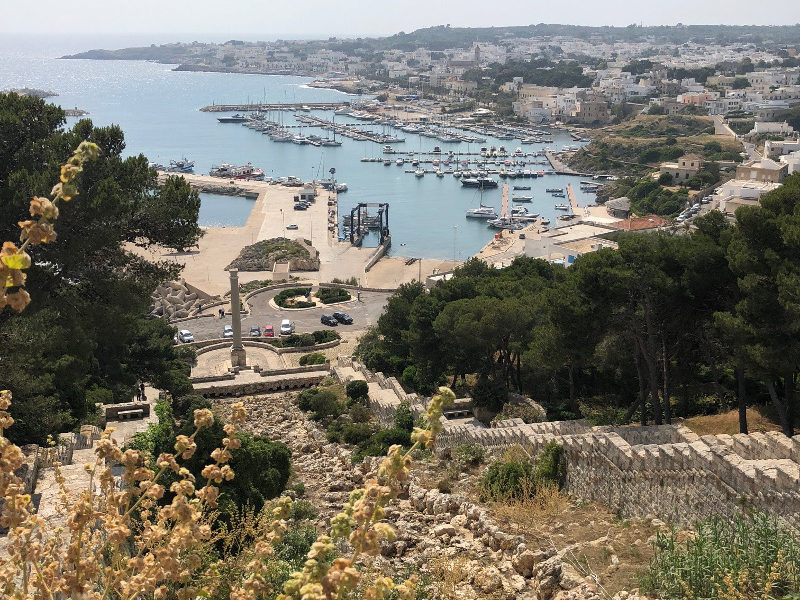
Italy´s worst harbour: Santa Maria Di Leuca
39° 47′ 45.7368” N 18° 21′ 40.8276” E
May 13th
Finally, we have reached the end of the country. Even the ancient Romans called Santa Maria di Leuca for “The Finibus Terrae”, which means the end of the country. We have reached the outermost part of the heel of the Italian boot, where further sailing to the east will inevitably bring you to either Greece or Albania. We choose – in the first place – Greece.
The port of Santa Maria di Leuca is lousy. It’s the most troubled harbour we’ve ever been in. Powerful moles are built, but apparently the authorities have forgotten to consult an engineer, because any wave of the ionic ocean propagates to a turmoil inside the harbour basin. Ronja jumps and dances. It pulls violently in the clamps, it rattles in wires and ropes and closets, and we are close to falling out of the bunk. Damned harbor. And the harbour office is completely unwilling to let us switch to one of the more quiet places in the basin – “they are reserved for big boats”, they let us know. And we do not see any big boats at all in the days, while we are waiting for better weather that can bring us out of Marina di Leuca and on to Greece. A completed lousy harbour. Zero stars out of five.
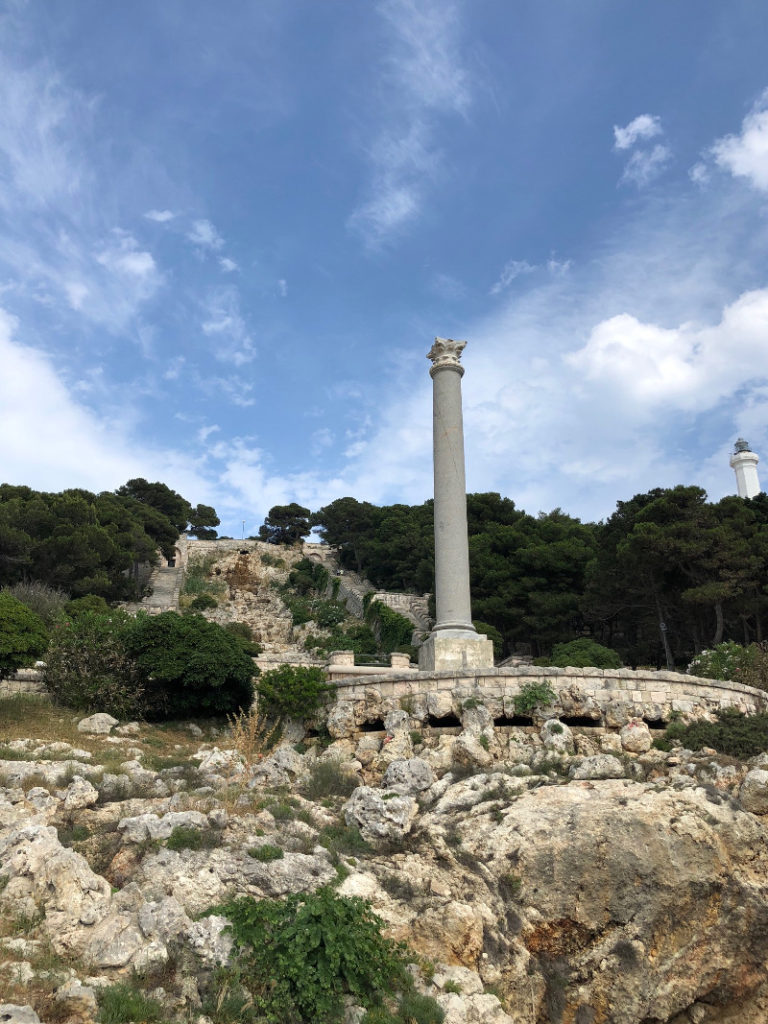
Mussolini insisted, that the greatest akvaduct of Europe should end in a waterfall, a monument and a 300 steps staircase, to welcome foreigners to Italy. A few times a year they still let out water from the top
That said, the city in itself is quite interesting. We see one of Mussolini’s prestigious projects, an aqueduct that ends in a waterfall and a 300-step staircase, as a kind of respect-giving portal to Italy. We see dozens of classical villas that make one think, that this could have been where the Roman senators in the times of Caesar went out for their summer holiday, but of course it is not, while these mansions probably have only three hundred years of history behind them. We inadvertently attend an Italian funeral. And we see a large number of peculiar installations along the coast, where busy businessmen have compensated for the missing beaches by building metal stands on top of the coastal lava cliffs and then coating the metal frames with wooden boards. And on these now there are several hundreds of sunbeds and umbrellas waiting for sunseeking tourists from northern Italy. Wooden beaches.
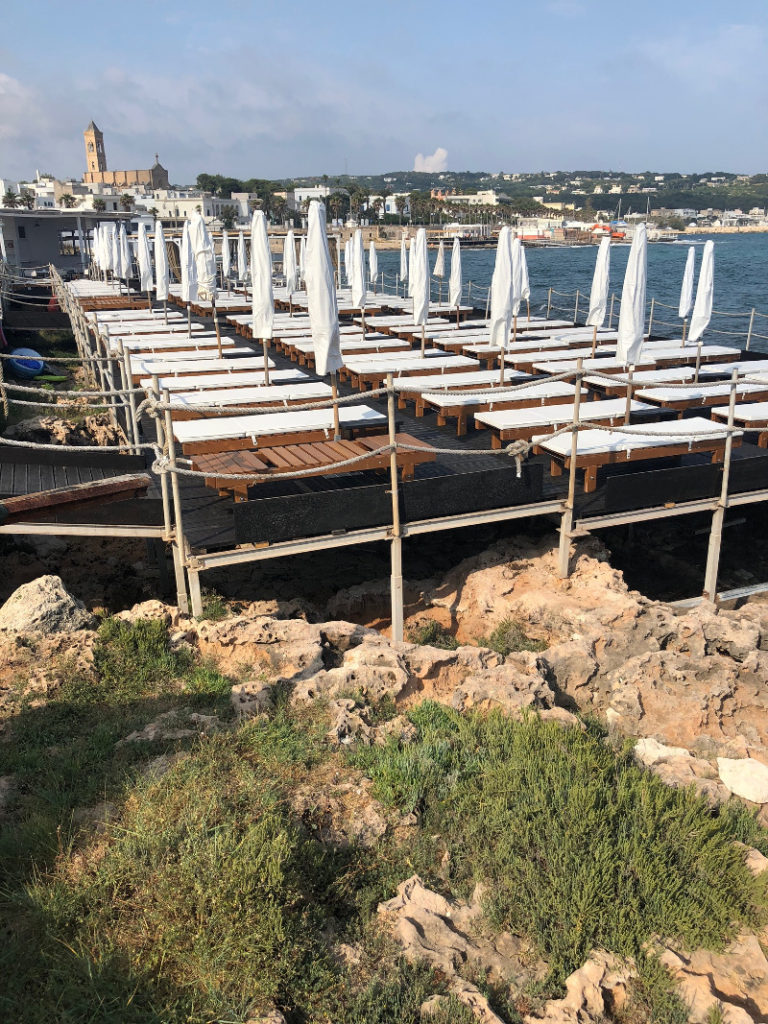
What to do if you do not have sandy beaches but “only” lava-cliffs? You build a wooden beach to support sunbeds and parasols
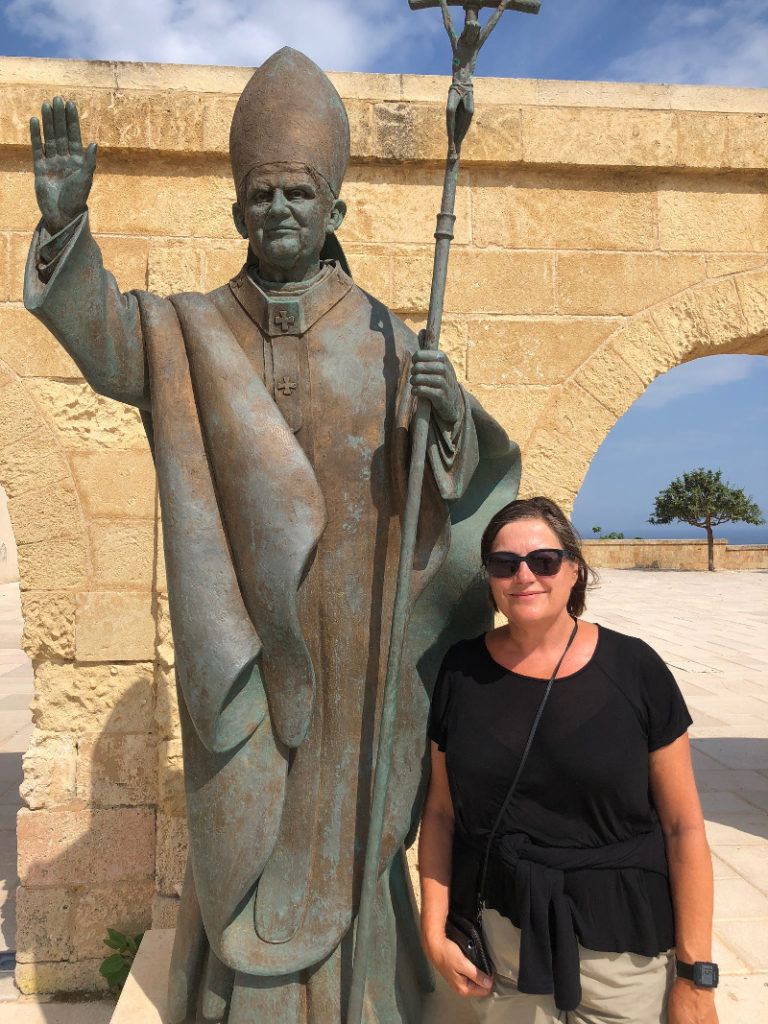
After visiting Santa Maria di Leuca in 2008 a statue of the pope was created. The pope is at the left
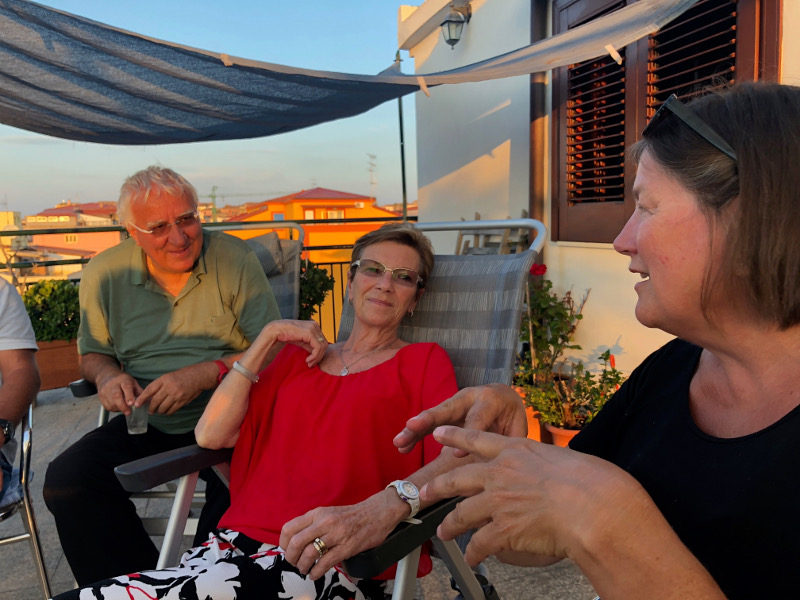
An invitation you can not refuse in Crotone
39° 4′ 44.4684” N 17° 8′ 16.278” E
May 11th
“Do you know that in Calabria it is an insult to say no, when a man invites you to his home? You can get away with that in Sicily. But not in Calabria.” The man behind these words seems quite compelling. His name is Pino, he is 70 years old, a big man, that speaks loud and deep and is remarkably good in English – and then he is from Calabria, born in the city of Crotone, to which city we have arrived with our good ship Ronja.
Pino has just invited us to his home, and this is of course wonderful, if it had not been because we had earlier said yes to an invitation to enjoy a drink with our British friends Claire and Derek as well as Elisabeth and Ken on board the boat “Pala”.
“Just bring them all,” Pino insists. “I have a small apartment but a big terrace. There can be a lot of guests on that terrace.”
“Do you also have a bus to drive us in?” I ask skeptically. “Yes, I have,” replies Pino, pointing to a minibus with nine passenger seats, that is parked at the quayside. He also has a Porche, a Ferrari, a motorcycle and a lot of other cars but hurries to add, that we should not think of him as a rich man. Because he is not.
With a blend of my Northern European factuality and Pinos more emotional arguing (“I am insulted, if you say no!”), we quickly convince Claire, Derek, Elisabeth and Ken to drop the planned drinks and instead go a long with Pino and his Danish-born wife, Helen, to their home in Crotone.
And of course, it turns out to be a wonderful experience. On a rooftop terrace on the 7th floor with a magnificent view over Crotone’s commercial port and the ionic sea, we enjoy Pinos and Helens boundless hospitality. We taste local specialties like brandy brewed on cactus flowers and brandy brewed on oranges. In addition bread, cheese and grilled peppers, and yes, some beer and wine to rinse after with. Helen enjoys speaking Danish with Kirsten and I, while Pino serves and talks about classic cars in English with our British friends.
Pino and Helen met in the 70’s, when they both worked in the EU. They still have a residence in Luxembourg, but spend more and more time in their apartment in Pinos childhood city, Crotone, where a daughter and a grandchild also live. And how did we meet Pino and Helen? Well, through the kind of coincidences, that fortunately the sailing life is so rich of. We were in Palermo with a Danish couple, Sten and Rie, for 14 days, and they told us, that if we came to Crotone in Calabria one day, we should contact their friends, Pino and Helen, and if we had some Danish books we had finished ourselves, we should give them to Helen, because she loves to read Danish books but rarely has the opportunity to do that.
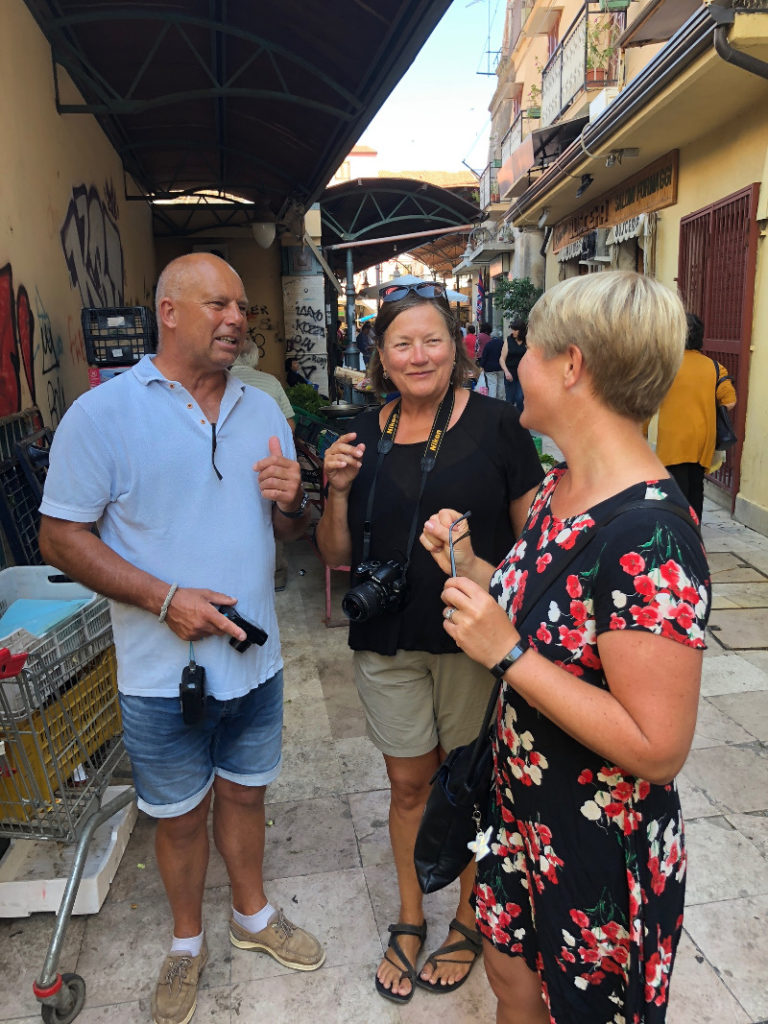
Derek, Kirsten and Claire in the charming and lively market of Crotone
Crotone is a wonderful city. From the outside, the eye first meets a number of gas extraction platforms and a large commercial port. But the city has history, culture, beaches, a big fortress with an old city within its walls, as well as a very lively market. Very charming. It is a city we definitely will return to. And by that time not just for two days.
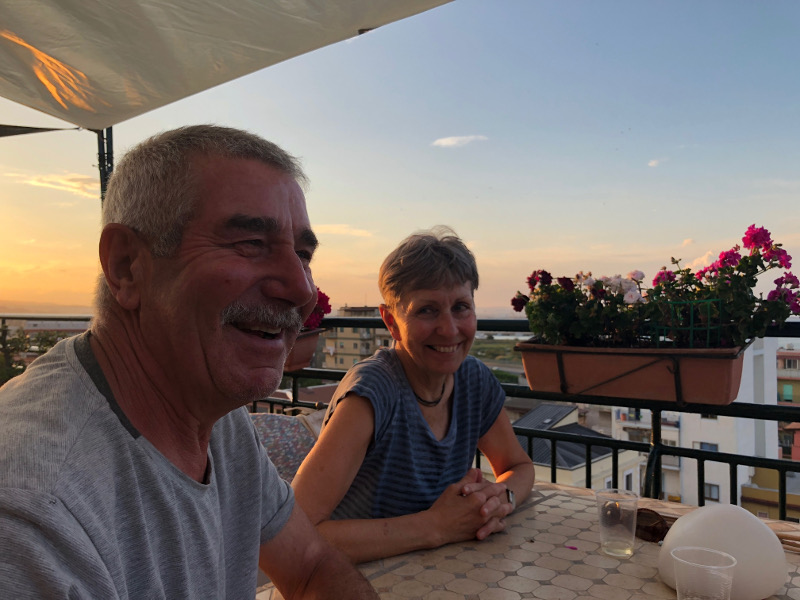
British saylors, Ken and Elisabeth, following the same route to Greece as we are. Here at Pino and Helens 7th floor terrace
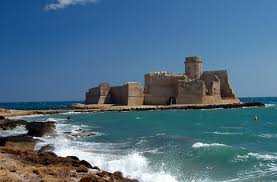
La Castella
38° 54′ 38.9772” N 17° 1′ 36.0912” E
May 10th
Nice little port for one night. A bit difficult to enter the marina because of underwater stones. Cheap but then again it is not a port you choose for its standard in toilet and shower conditions. We buy provisions in the small town, sleep and then sail on.
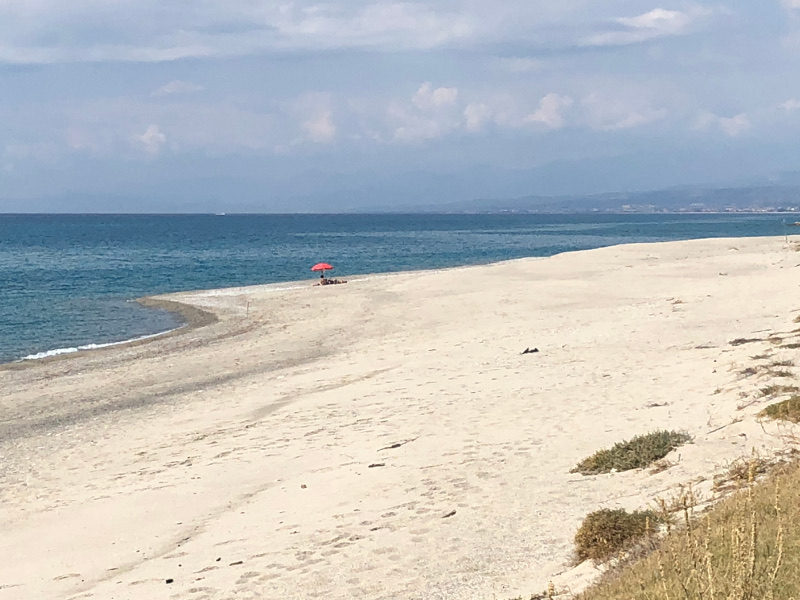
Underneath the Italian boot: Rocella Ionica
38° 19′ 40.512” N 16° 25′ 59.6676” E
May 9, 2018
Fast lizards run around our feet, as we walk the three kilometers from Porto delle Grazie to the town Rocella Ionica, and again we feel that our destinations are often more of a mood than a particular geographic location.
Freshly clean sea air mixed with the fragrance of spring flowers, freshly cut grass and small pine plantations. Kilometer-long beaches with – at this time of year – only one single red parasol that beautifully matches the turquoise-blue Ionic ocean. Old men are sitting in the shade on their plastic chairs and watch the world pass by.
After 12 hours of sailing – three hours for sail and nine hours for motor – we have crossed the Messina Strait and laid the majestic profile of Sicily and Etna behind us. We have sailed up under the Italian boot, where the mainland of Italy will become the framework for our next experiences, and we have seen – from the sea – how the landscape has changed from Sicily’s lush green east coast to Calabria’s dry and rough mountain slopes. From dense residences to scattered residences. We have to go far up the mainland coast, before we find a real port.
The port of Rocella Ionica is called Porto delle Grazie, and it is large, well-protected and well-functioning. We are approaching Greece, which causes harbor prices to fall. “We have to be competitive, otherwise our customers will sail directly to Greece,” says Francesco, who in white shirt and jacket controls the guest harbor, while calling you for captain in every other sentence.
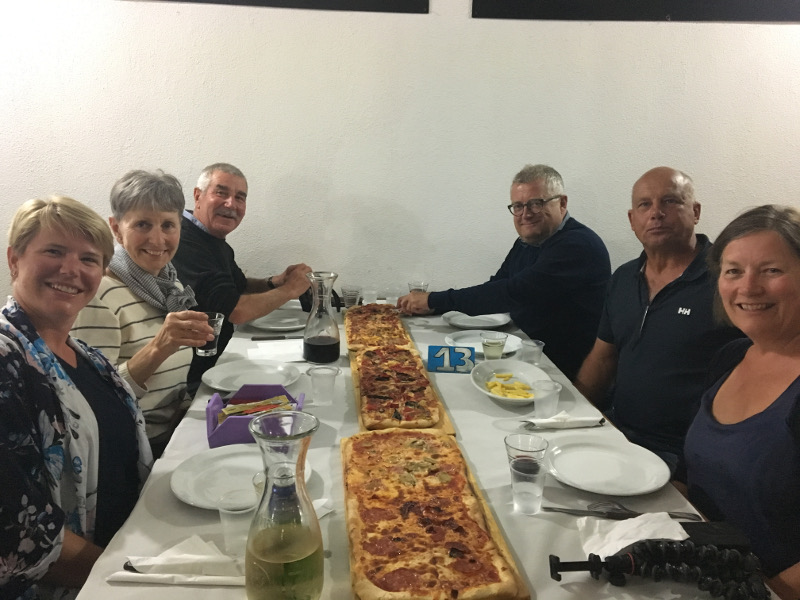
Ready for 1,5 meter of italian pizza and a british-danish sailor-reunion
We dine in the harbor’s excellent pizzaria together with two British crews, Claire and Derek from the boat “Red Rooster” that we have previously been with in San Remo, Genoa and Riposto, as well as Elisabeth and Ken from the boat “Pala”, whom we learned to know in Riposto. The specialty of the place is pizza by the meters. We order one and a half meters and have a really pleasant evening.
Bonus info: If you are good at hackling the prices, then you should definitely use this skill in southern Italy, where we often experience that the list price for a berth for your boat can be negotiated significantly, especially if you can suggest, that you might stay in the port for several days if the price is good. Of course, it also helps us to sail outside the high season, but we have experienced the price in for one night in Riposto started at 55 Euros and ended in 42 Euros per night. And in Lipari the opening price of 40 Euros, was changed into 30 Euros.
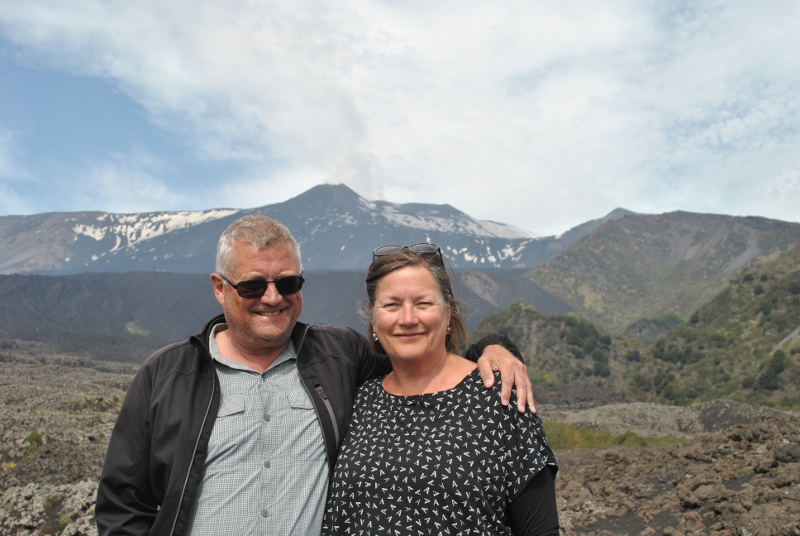
Quiet days in Riposto
37° 43′ 50.1528” N 15° 12′ 31.9068”
May 7, 2018
“Etna releases gas today. That’s a good sign”, says my taxi driver, Emanuele, as he drives me to Catania Airport. When Etna releases gas, it’s a sign of peace and no danger, when on the contrary she pauses for many days, it may be because she is building up to a major eruption, he explains.
Emanuele lives himself at the foot of Etna, in the town of Giarre, and it is part of his daily routine, that he starts the day watching the volcano to assess what mood she is in today. Etna’s mood is part of the reality of life when living at the foot of the volcano, and Emanuele makes few concerns, because the recent eruptions have stopped just before the lava wiped out the first village on its way. So, no worry.
I ask him if it’s cheap to buy land and property, when living on the edge of a volcano. No, he answers. It is expensive to live in the metropolitan areas of Sicily and cheap to live in the country. But it is not cheaper to live on the edge of Etna than elsewhere in the country. And the earth is amazing. It is lush. Wine, flowers, grass and trees bubble of vitality.
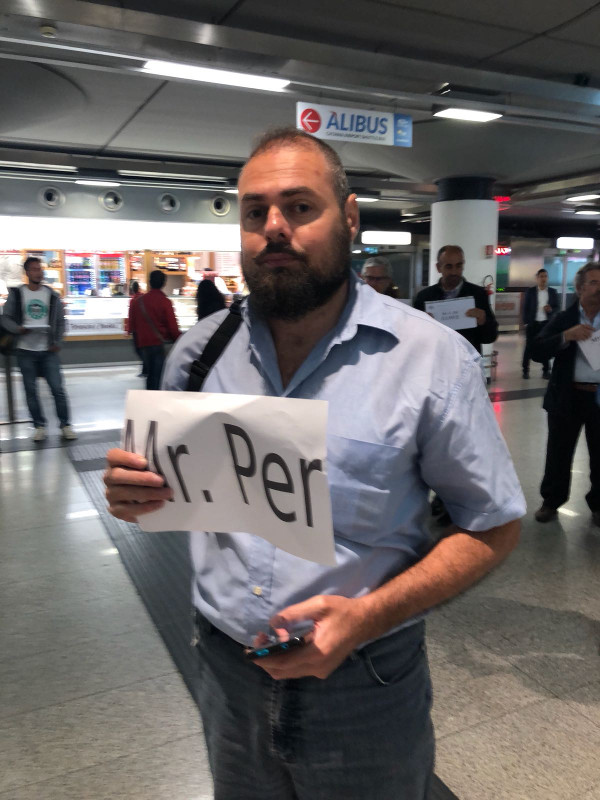
VIP-reception in Catania Airport – Emanuele my taxidriver from the hillside of Etna.
Ronja is moored in “Porto dell ‘Etna” just below the volcano, in the town of Riposto, and it is a perfect starting point for trekking on Etna, visiting the tourist resort of Taormina, swimming in the Mediterranean in late April or exploring the city centers in Catania and Syracuse.
Riposto is not much to write about in itself, except that it is a city, that is completely unaffected by tourism. The city lives its very own life. The inhabitants fish, grow tomatoes, oranges, wine or they drive to work in Catania or Taormina and the city do not need to please the tourists. Everything – shops, cafes and traffic – is aimed at the city’s own inhabitants. Only the marina adds a modest touch of tourism.
Riposto, along with the neighboring town of Giarre, has a common train station, which brings you to Catania or Taormina for typically three euros and to Syracuse for eight euros. And if there is anything, Italians are good at, it is running trains precise on time. They export all of their technological train-wonders to Denmark, sticking themselves to their old trains. Out of our eight train-trips only one was delayed and only by five minutes.
Taormina is a hit. We are sometimes a bit annoyed by over-touristed Italian cities, and Taormina is over-touristed, but it is so with a lot of good reasons. It’s an unlikely beautiful city, glued to a mountain side overlooking the sea, ancient as Metusalem, green and charming, and with a cable car down to the sea, where in particular Lido la Pigna is a balm for the soul with the sound of waves, lovely sand and lush swimming waters. The mood of holiday that is good to be a part of.
Syracuse we should have spent more time in. It is full of history and culture. A beautiful city, which we will revisit with Ronja one day instead of by train.
Catania is Sicily’s second largest city, youthful, dynamic with beautiful churches, theaters and art museums, while colossal elongated rock formations in the form of stiffened lava at the outskirts of the city bear witness to the days, when the city was washed in the sea by a violent eruption from Etna. It is only 300 years ago.
And then we’re back to Etna. Everything depends on the volcano. Does it release gas today? Or does it take a break and build up to something big? On the one hand scary but at a paradox also conforting and fascinating.
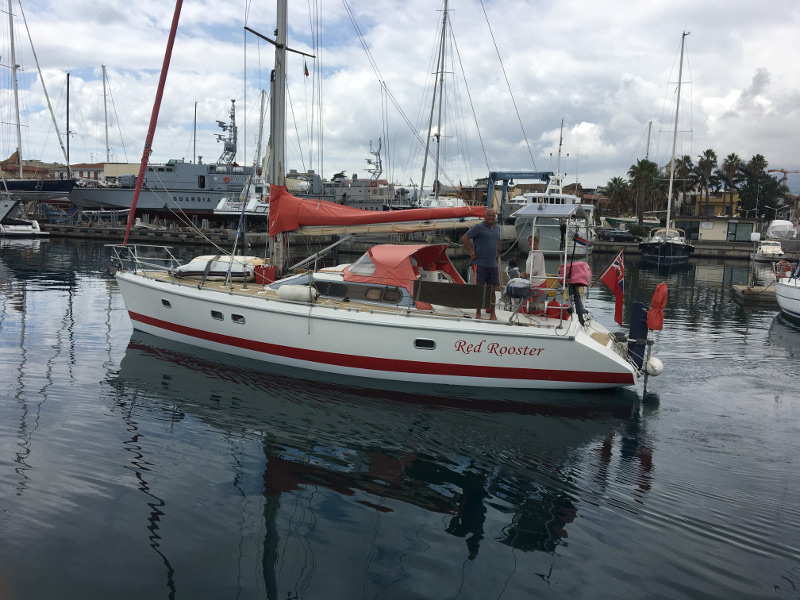
Reunion after two years – Claire and Derek, that we met in Northern Italy, suddenly turns up in Riposto. Nice surprise
Our stay in Riposto will be 14 days, partly because Per travels a few days to Denmark to work, but also because the harbor is calm and well functioning, and the city appears as a more unspoilt Italian province than many others we have visited.